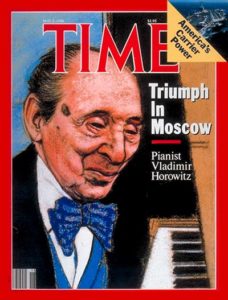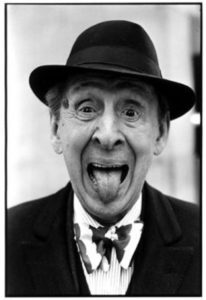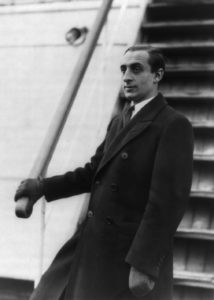
We mark the solo piano recital on April 20, 1986 – 34 years ago today – that saw Vladimir Horowitz perform at the Great Hall of the Moscow Conservatory. Horowitz, who was 82 years old at the time, had not visited or performed in his native Russia for 61 years.
Not since Franz Liszt (1811-1886) had a pianist routinely electrified audiences as did Horowitz (1903-1989). It wasn’t just his flawless technique: the amazing colors he could draw from the piano; the preternatural accuracy and clarity of his playing; the ungodly speed of his octaves and the overwhelming volume of sound he could produce without ever banging. It was also the prodigious electricity – the sheer excitement – he generated on stage, what the senior music critic of The New York Times Harold Schonberg called:
“a kind of high-voltage charisma that, in his time, could be matched only by Toscanini, Callas, and Pavarotti.”
The American pianist Emanuel Ax said:
“I knew people who worshiped Horowitz, as I did, and I knew people who hated him. But no one was indifferent. He brought the idea of excitement in piano playing to a higher pitch than anyone I’ve ever heard. For me the fascinating thing was a sense of complete control, and on the other hand, the feeling that everything was just on the verge of going haywire. It never did go over that line, but there was the sense of an unbelievable energy being harnessed, and the feeling that if he ever let it go, it would burn up the hall.”
According to Andre Watts, Horowitz:
“was like a demon barely under control out there on stage.”
According to the man himself:
“The most important thing is to transform the piano from a percussive instrument into a singing instrument . . . a singing tone is made up of shadows and colors and contrast. The secret lies mainly in contrasts.”

A musical personality as outsized as Horowitz’s will inevitably elicit criticism, and the most frequent criticism was that he took too many liberties with the music he performed. On just these lines the composer and critic Virgil Thomson whined that Horowitz was “a master of distortion and exaggeration.”
For Horowitz, such critiques were spitballs at a battleship.
“When I sit at the keyboard, I never know how I will play something. I play the way I feel at the moment. The head, the intellect, is only the controlling factor of music making. It is not a guide. The guide is your feelings. Chopin never played his own pieces the same way twice.”
At another time Horowitz said:
“I am a 19th-century Romantic. I am the last. I take terrible risks. Because my playing is very clear, when I make a mistake, you hear it. But the score is not a bible, and I am never afraid to dare. The music is behind those dots. You search for it, and that is what I mean by the grand manner. I play, so to speak, from the other side of the score, looking back.”
Vladimir Samoylovich Gorowitz was born in Kiev (then part of the Russian Empire, today the capital of Ukraine) on October 1, 1903. He was the youngest of four children of Samuil Gorowitz and Sophia Bodik, who were assimilated, upper-middle-class Jews. (Horowitz did not change the first letter of his last name from “G” to an “H” until his Berlin debut in 1925.) He was prodigiously talented; entered the Kiev Conservatory in 1912; and gave his first public concert in Kiev on May 30, 1920. By the time of that concert – 1920 – the Russian Revolution had already occurred and the newly formed “Soviet Union” was engaged in a vicious, even genocidal Civil War. The Horowitz family, their belongings confiscated by the Soviets, had been rendered destitute. For the rest of his life, Vladimir (or “Volodya”, as everyone knew him) maintained that he really wanted to be a composer but took up the career of a performer to feed his family.
And feed them he did. He rapidly became one of the best known and most beloved performers in the new Soviet Union. When the 22-year-old Horowitz left the Soviet Union for what was supposed to be a brief concert tour of Western Europe in 1925, one of the border guards put his hand on Horowitz’s shoulder and told him:
“While you are gone, do not forget your Motherland.”
As the story goes, “Horowitz, though touched by this admonition, was also profoundly relieved that the guards didn’t ask him to remove his shoes, for in them were hidden thousands of American dollars,” money intended to facilitate his escape to the West.
Horowitz’s exit visa was good for six months; as it turned out, he stayed away for 61 years.
On December 18, 1925, Horowitz performed in Berlin, his first appearance outside of Russia.
On January 12, 1928, he made his American debut when he performed Tchaikovsky’s Piano Concerto No. 1 at Carnegie Hall under the baton of Sir Thomas Beecham. The audience and critics were awestruck; it was very likely the most critically acclaimed debut performance ever to take place in North America.

In 1933 Horowitz performed for the first time with the conductor Arturo Toscanini, and a few months later he married Toscanini’s daughter Wanda.
In 1944, Horowitz became an American citizen and was, through the 1940s, the highest paid concert artist in the world.
He was also among the most neurotic. Such was his stage fright that he often had to be pushed physically onto the stage. Incredibly, Horowitz chronically believed himself to be inferior and inadequate. Writing in the New Grove Dictionary of Music and Musicians, his biographer Harold Schonberg observes:
“He never succeeded in resolving his basic problem: was he living up to his potential? Was he a great musician or a mere entertainer?”
Horowitz’s neuroses manifested themselves in extended bouts of severe depression, which was treated with a heavy regimen of antidepressants as well as shock therapy in the 1960s and 1970s.
Horowitz’s sexuality contributed to his neuroses. Publicly heterosexual, it was nevertheless acknowledged by people in-the-know that he was homosexual; according to the pianist Artur Rubinstein:
“everyone knew and accepted him as a homosexual.”
According to Horowitz biographer Glenn Plaskin:
“In December 1940, Horowitz had begun psychoanalysis with an eminent psychiatrist, Dr. Lawrence Kubie, a strict Freudian who was attempting to exorcise the homosexual element from Horowitz.”
Well, that didn’t work, and Horowitz – like the vast majority of homosexuals of his time – spent his adult life hiding (and denying) his sexuality. Tellingly, he once quipped that:
“There are three kinds of pianists: Jewish pianists, homosexual pianists, and bad pianists.”
Because of his nerves, neuroses, and depression Horowitz retired from the concert stage four times across the span of his career, 1936-1938; 1953-1965 (during which he focused on studio recording; for our information, over the course of his career, Horowitz won 25 Grammy Awards); he retired as well from 1968-1974; and then again, from 1983-1985.

When he did perform, Horowitz made demands that would make a pop diva blush. His rider required that his personal piano travel with him from his townhouse on East 94th Street in Manhattan to wherever he performed. (The piano, a Steinway D built in 1941 and acquired soon after, bears the serial number 314503. He used it in his recitals, his recordings, as well as the concerts during his triumphant return to Russia/the Soviet Union in 1986.) For the final 24 years of his life, Steinway’s chief technician – Franz Mohr – travelled with Horowitz wherever he went; no one else was ever allowed to tune and regulate Horowitz’s piano. The maestro insisted that his concerts take place only at 4 pm on Sundays, when he believed audiences were best rested and prepared to listen. Advance teams would decorate his hotel rooms in the style of his New York living room, so that he’d feel the comforts of home. Aside from his wife, manager, and technician, his entourage also included a personal cook.
“I have to take my own cook because I can’t eat hotel food. I don’t eat meat. I’m not sick. It’s just a belief.”
Instead, he ate Dover Sole every day, which – if necessary – would be flown in fresh on a daily basis. In addition, Horowitz took a water purifying machine with him wherever he went, explaining:
“Every place has a different kind of water, and I don’t want foreign chemicals in me.”
In 1985, the 82-year-old Horowitz emerged from his fourth (and as it turned out) final retirement. He had stopped taking anti-depressants and drinking alcohol and was both physically and mentally in better shape than he’d been for many years. And thus, the stage was set for Horowitz’s “return” to Russia for the first time in 61 years, to concertize first in Moscow and then St. Petersburg.

The first of the concerts took place in Moscow, at the Great Hall of the Moscow Conservatory, on Sunday, April 20, 1986, 34 years ago today. It began at 4 pm, as would any concert performed by Vladimir Horowitz. Most of the seats in the 1,800-seat hall were occupied by government poohbahs and members of the diplomatic corps; only 400 tickets were made available to a general public that was desperate to attend. Having said that, the tight security could not prevent some 200 Conservatory students from rushing the hall and occupying the back wall and aisles of the balcony; the noise of their entry can be heard at the beginning of the first cut of the recording of the concert, during Scarlatti’s Sonata in E Major, L. 23.

The concert was a triumph. The slightly stooped Horowitz emerged on stage in a blue suit and bow tie; the audience went crazy; he wandered over to the piano, shrugged, waved, smiled nervously, sat down and proceeded to play with a serenity and sweetness and subtlety and power that only the greatest artists of any age can conjure up. Of course the audience cheered and wept (as we do when we listen to the recording or watch the video), and never more so than during one of Horowitz’s encores, the quiet and ineffably beautiful Traumerei (“Dreaming”) from Robert Schumann’s Kinderszenen (“Scenes from Childhood”) of 1838.
It is difficult for Westerners to comprehend the significance of Schumann’s Traumerei to the Soviet (and now Russian) people.
In 1945, Schumann’s Traumerei was selected by some forgotten apparatchik at Radio Moscow to be played in the background during a moment of silence at 6:55 pm on May 8, 1945 – the moment World War II ended in Europe – a moment of silence in memory of the victims of the war against Nazi Germany.
Whoever that Radio Moscow functionary was, he has gained a measure of immortality for what was an inspired choice. Schumann’s Traumerei evokes a mood of aching melancholy, loss, and nostalgia, a mood very different from that evoked by the military or funeral music that might have been chosen. Schumann’s Traumerei was immediately embraced by the Soviet people, who perceived in its sweetness and longing not just their own grief but a healing sense of peace as well. Traumerei became the go-to piece played by Soviet military bands at World War Two memorial ceremonies. To this day, it is played every hour on the hour at the massive war memorial at Mamayev Kurgan, the hill that dominates the city of Volgograd, formerly known as Stalingrad. It has been played 24-7 at St. Petersburg’s Peskaryev Memorial Cemetery since it opened in 1960. It was performed at Joseph Stalin’s funeral on March 9, 1953.
It is a magnificent irony that the music of a nineteenth century German composer has come to embody the memory of the 26.6 million Soviets who lost their lives in a war against Germany. And all of that irony and all of Traumerei’s tender, aching beauty is wrapped up in Horowitz’s performance, which he concludes with a tiny shrug, as if to say, “that’s the best I can do.”
Back in New York City, the columnist Andy Rooney watched live as Horowitz played Schumann’s Traumerei. He wrote the next day:
“During the latter part of the concert, watching this 82-year-old genius play, I found mist forming in my eyes for some mysterious reason I could not explain. I was not sad. I was exultant. It had something to do with my pride, at that very moment, in being part of the same civilization that this great and endearing man playing the piano was part of.
“Almost at the same instant I felt the suggestion of tears in my eyes, the television camera left Horowitz’s fingers on the keyboard and dissolved to the face of a Soviet citizen in the audience. He did not look like the enemy. His eyes were closed, his head tilted slightly backward so that his face was up, and one lone teardrop ran down his cheek.
“It was the same teardrop running down mine.”
Listen on the Music History Monday Podcast
Podcast: Play in new window
Subscribe: Apple Podcasts | Spotify | Pandora | iHeartRadio | RSS | More
